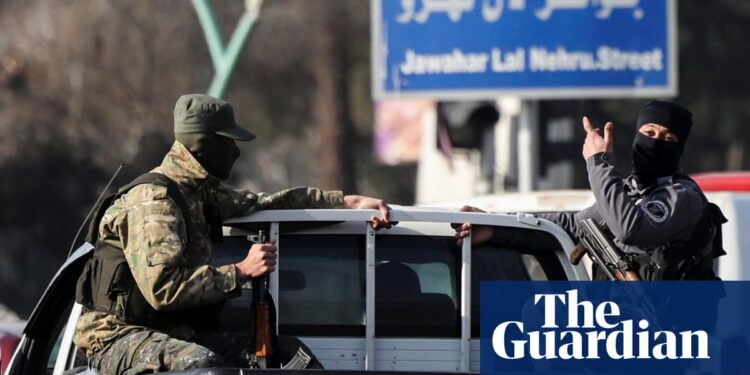Fourteen security personnel from Syria’s new authorities and three armed men were killed in clashes in Tartus province after forces tried to arrest an officer linked to the notorious Sednaya prison, according to the Syrian Observatory for Human Rights.
The UK-based monitoring group said the clash broke out in Tartus, a stronghold of the ousted president, Bashar al-Assad’s Alawite minority, on Wednesday, and was sparked by the attempted arrest of the former prison official.
Syria’s new interior minister confirmed the deaths in a message on Telegram, and said 10 police officers were also wounded by what he called “remnants” of the Assad government. The minister vowed to punish anyone who dared “to undermine Syria’s security or endanger the lives of its citizens”.
On Thursday, the new Syrian military leadership said it had launched an operation to pursue the last pockets of support for Assad’s regime in the countryside of Tartus, the state news service Sana reported.
The operation had already succeeded in “neutralising a certain number” of armed men loyal to the toppled president, Sana said. The Syrian Observatory for Human Rights reported several arrests in connection with Wednesday’s clashes.
Wednesday’s deadly incident came as demonstrations and an overnight curfew elsewhere marked the most widespread unrest since Assad fled Syria more than two weeks ago, raising fears of the sectarian violence that dominated the 13-year-long civil war.
The demonstrations occurred around the same time that an undated video was circulated on social media that showed a fire inside an Alawite shrine in the city of Aleppo.
The interior ministry said on its official Telegram account the video dated back to the rebel offensive on Aleppo in late November and the violence was carried out by unknown groups, adding that whoever was circulating the video now appeared to be seeking to incite sectarian unrest.
In the city of Homs, Syrian police imposed an overnight curfew, state media reported, after skirmishes there linked to demonstrations residents said were led by members of the minority Alawite and Shia Muslim religious minorities.
One demonstrator was killed and five others wounded in Homs “after security forces … opened fire to disperse” the crowd, Agence France-Presse reported, saying the protests were sparked by the video of the Alawite shrine.
Some residents told Reuters the demonstrations were linked to pressure and violence in recent days aimed at members of the Alawite minority.
Syria’s new ruling administration, led by the Sunni Islamist Hayat Tahrir al-Sham (HTS) group, did not immediately respond to requests for comment on the curfew. State media said the curfew was being imposed for one night, from 6pm local time (1500 GMT) until 8am on Thursday morning.
The observatory also reported demonstrations by thousands in Tartus and Latakia, also an Alawite stronghold, as well as other areas, including Assad’s home town of Qardaha.
The protests were the largest by the Alawites since Assad’s fall on 8 December, and came after hundreds of Syrians protested in the capital, Damascus, against the torching of a Christmas tree.
The country’s new leaders have repeatedly vowed to protect minority religious groups, who fear the former rebels now in control could seek to impose a conservative form of Islamist government.
In a predominantly Alawite neighbourhood of Damascus, Alawite sheikh Ali Dareer told Reuters on Thursday that homes had been vandalised and people beaten on the basis of their religious identity, despite HTS promises the community would be treated with respect. He blamed “a third party” trying to incite discord.
Dareer said that the community had extended its hand to the new government but there “have been many violations”, citing multiple accounts of people being beaten at a checkpoint.
An HTS fighter in the area said there had been an incident on Thursday in which Alawites were taken off a bus and beaten because of their religion, but denied that HTS was responsible.
Assad’s long-time regional ally, Shia-majority Iran, has criticised the course of events in Syria in recent days. Syria’s newly appointed foreign minister, Asaad Hassan al-Shibani, said earlier this week that Iran must respect the will of the Syrian people and Syria’s sovereignty and security.







